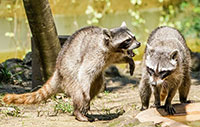 Raccoons aren’t exactly the most subtle creatures. They’re nocturnal, which means that they do a lot of their scavenging for food at night and sleep during the day, although the number of raccoons seen during the day is increasing in cities like Toronto due to the constant availability of food and lack of predators in the city. But none the less, they are still more active at night, and that means they also make a lot of noise at night. To the untrained ear, hearing some of the sounds raccoons make at night can be jarring, especially if you don’t know what it is you’re hearing. If you suspect you might have raccoons living in or around your property, keep reading to learn about what noises raccoons make and how you can identify them.
Raccoons aren’t exactly the most subtle creatures. They’re nocturnal, which means that they do a lot of their scavenging for food at night and sleep during the day, although the number of raccoons seen during the day is increasing in cities like Toronto due to the constant availability of food and lack of predators in the city. But none the less, they are still more active at night, and that means they also make a lot of noise at night. To the untrained ear, hearing some of the sounds raccoons make at night can be jarring, especially if you don’t know what it is you’re hearing. If you suspect you might have raccoons living in or around your property, keep reading to learn about what noises raccoons make and how you can identify them.
Hawkeye’s Raccoon Prevention, Control, and Removal Services
Raccoons are nuisances and can cause a lot of property damage and disturbance if they make their way into your residential or commercial property. Their main goal is to find a steady and reliable food source. Once they’ve found one, they’ll fight tooth and nail (literally) to hang on to their territory, especially if they’ve already set up den there.
Hawkeye Bird and Animal Control uses several effective, safe, and humane raccoon prevention, control, and removal practices to get raccoons off your property for good. We have the proper tools, equipment, and skillset to handle all kinds of animal presences on your property in a safe and humane manner with minimal damage to your property.
What Noises Do Raccoons Make?
How do you know if you have a raccoon infestation on your property? Raccoons make a wide range of distinct sounds that are either produced from the mouths or as they move around. As mentioned, they’re not subtle or stealthy creatures and they don’t care if they disturb others in their endless pursuit of a nighttime meal. Here are some communication-based noises raccoons make:
Raccoon Chittering
Chittering is one of the most common and distinct forms of vocal communication raccoons use. Adult raccoons typically chitter as a form of communication with one another, while baby raccoons chitter to get the attention of their mothers. Other instances of raccoon chittering include when they’re searching for a nesting place, food sources, or when they’re just milling about.
Raccoons Growling or Hissing
Animals typically growl or hiss when they’re angry or in a state of distress. Raccoons are no exception to this rule. While they’re usually fairly calm and non-violent creatures when unprovoked, raccoons can exhibit some aggressive traits when they feel threatened or if they’re rabid.
Mother raccoons become especially aggressive if someone or something poses a threat to their kits. They immediately go into defensive mode to protect their young and won’t hesitate to scratch or bite the perceived threatening culprit.
Raccoons Barking
Believe it or not, dogs aren’t the only creatures in the animal world that bark when they’re distressed. Raccoons bark when they’re injured, in pain, or feel threatened. Mother raccoons in particular bark when their kits go missing. They use this vocalization as a means of attracting their babies back to them.
Aggressive Raccoon Sounds: Snarling, Screaming, Screeching, and Squealing
Raccoons can get very aggressive even with their own kind. Physical brawls can often breakout between raccoons from different nurseries that are encroaching on each other’s territories. When this happens, you’ll often hear raccoons hissing at each other right before the fight is about to get into full swing.
What do raccoon fights sound like? Once the raccoons pounce on one another and start scratching and biting, you’ll likely hear a lot of snarling, screaming, screeching, and squealing noises that faintly resemble car alarms somewhere off in the distance. If you come across two or more raccoons in the middle of a tussle, don’t get too close as you could be mistaken as another aggressor in which case, they’ll most likely attack you as well.
Baby Raccoon Sounds: What Do Baby Raccoons Sounds Like?
Similar to human infants, baby raccoons also make a series of distinct sounds to communicate their current temperaments, desires, and needs to their mothers. Baby raccoon sounds include chirping, squealing, crying, cooing, and mewing based on their moods and whenever the situation calls for it.
Baby raccoons make these distinct sounds for a variety of reasons including to indicate they’re hungry, happy, in danger, in distress, or scared. They typically cry or squeal to get their mother’s attention or when the mother is away scavenging for food. As they get older, the intensity and degree of these sounds changes, much like when human adolescents experience vocal maturation during puberty.
What Do Rabid Raccoons Sound Like?
Raccoons are one of the main carriers of the rabies virus, which can be transmitted to humans and other animals through scratches and bites. Therefore, it’s important to be able to recognize if you’ve come in contact with a rabid raccoon.
Healthy raccoons typically only make noise or vocal sounds when they’re with or around other raccoons. When they’re alone, healthy raccoons are usually quiet and calm for the most part.
Rabid raccoons tend to take on more aggressive tendencies such as hissing and growling even when they’re unprovoked. If you see a raccoon exhibiting this type of behaviour, it’s best to keep your distance and contact a professional raccoon control unit.
What Sounds Do Raccoons Make at Night?
Not all raccoon sounds are necessarily vocalizations or forms of communication. Raccoons also make a lot of noise simply by going about their business. Common movement-based raccoon sounds you might hear as they forage for food include:
- Rustling
- Scratching
- Dragging (usually moving objects around while they look for food or dragging large food items back to their dens)
What are my options for Raccoon Control, Removal, and Prevention Services in the GTA
At Hawkeye Bird and Animal Control, all of our technicians have many years of experience working in the animal control industry. We are the only pest bird and animal/wildlife control company in Canada designated "Certified Wildlife Control Professional." We hold the following licenses: Trapping of Fur Bearing Animals Permit, Falconry Permit, and Pest Control License.
We are also the only company in the GTA allowed to permanently remove nuisance fur bearing animals, while other companies are required to trap and release the animals.
If you have a raccoon problem on your residential or commercial property, contact us today to learn more about our services.
Hawkeye specializes in providing humane and natural, environmentally friendly services, solutions, products and systems for pest animals and wildlife who are in conflict with humans or property. Control methods include animal removal, repellents, barriers as well as human protection from damage, disease & health hazards.
Why Hawkeye?
We GUARANTEE results. We offer PERMANENT solutions above and beyond what other companies can offer. Hawkeye is the ONLY pest bird and animal/wildlife control company in Canada designated "Certified Wildlife Control Professional" AND holding the following licenses:
- Trapping of Fur Bearing Animals Permit: In contrast to all other companies, we can euthanize the bird or fur-bearing animal, thus guaranteeing it will not return.
- Falconry Permit: We use Birds of Prey (hawks, owls, falcons, eagles) to scare, chase, or remove in a natural and humane way.
- Pest ControlLicense: We can employ chemical solutions to certain problems. These methods include natural pesticides.
Now with 7 Locations ( 6 In Canada and 1 in the U.S), we are ready to serve you better in Acton, Toronto, Oshawa, Bowmanville, two locations in Mississauga and West Palm Beach in Florida.
Contact us today or email us at [email protected] if you need help with pest wildlife/animal control and/or pest animal removal.
Pest wildlife animals like Bats, Bears (Black, Brown), Beavers, Bobcats, Cats - Domestic (Feline), Chipmunks, Coyotes, Deer, Elk, Fox, Groundhog, Marten, Mink, Moose, Muskrat, Porcupine, Possum/Opossum, Rabbits, Raccoons, Skunks, Squirrels (Black, Grey, Red) and Lynx














